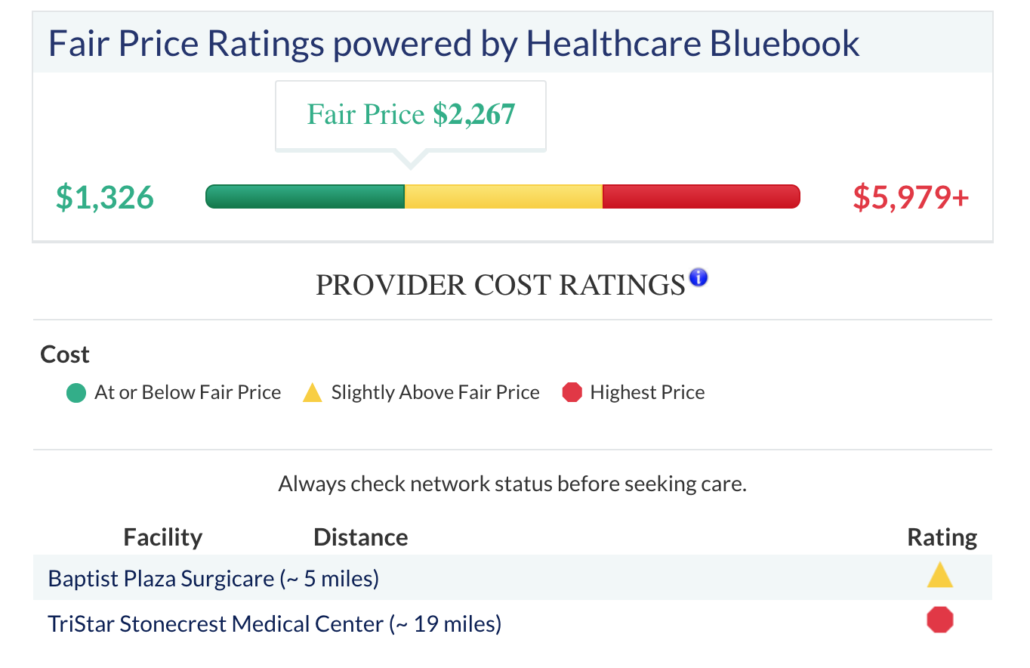GASTROENTEROLOGY ENDOSCOPY CENTER
OUR PROCEDURES
OUR PROCEDURES
Thank you for your interest in learning more about your colonoscopy. In the sections that follow, we will provide you with detailed information on the procedure, how it’s performed and why it’s important.
We realize that our patients are responsible for more of the cost of their own health care. We are a Valued-Certified provider powered by Healthcare Bluebook, providing area pricing information to help you spend your money wisely. While this pricing information does not represent an offer of a specific price, it can help you make a better, value-based, health care decision. Click here to learn more or request an appointment.

Results are customized to the zip code: 37205
The “Fair Price” is Healthcare Bluebook’s recommended price for a given health care service based on the amount providers typically accept as payment from insurance companies. As a Value Certified Provider, Healthcare Bluebook has independently verified that our prices generally fall at or below this amount. It does not, however, guarantee a particular price. Please check the provider’s network status and price before making an appointment.
A colonoscopy is a visual examination of the entire large intestine, also known as the colon. This exam is used to explore possible causes of abdominal pain, rectal bleeding, chronic constipation, chronic diarrhea and other intestinal problems. A colonoscopy is also used as a method of screening for colon cancer.
A gastroenterologist (GI) uses a lighted, flexible tube called a colonoscope that has a small video camera attached to the tip, allowing the GI doctor to view the inside of the entire colon. GI doctors can also sample tissue and/or remove polyps in the colon during a colonoscopy.
Men and women who are at average risk for colon cancer are advised to schedule regular colonoscopies starting at age 50 (age 45 for African Americans), and continue to get a colonoscopy at 10-year intervals thereafter to screen for colon cancer. Patients who have a family history of colon cancer, have inflammatory diseases such as inflammatory bowel disorder (IBD) or other risk factors for colon cancer may be advised to be screened earlier or at increased frequency.
Preparing for a Colonoscopy
Thorough cleansing of the entire bowel is essential for effective results so there will not be a need for retesting. Instructions for doing this will be given by your physician, but this can include a combination of the following: restriction from eating solid foods a day or two before the test and taking pill-form and/or liquid laxatives. The following recommendations are general guidelines, however, your physician may have varying instructions for your specific procedure. Please confirm with your physician the details of your prep instructions.
You will not be able to eat or drink the day of the procedure. You may be asked to stop strong blood-thinning medications for before the procedure as well. Check with your physician for exact instructions.
To avoid dehydration, patients should drink clear, fat-free bouillon or broth, gelatin, strained fruit juice (no grape juice or any liquid with red color) and water. Unless otherwise instructed, continue taking any regularly-prescribed medication. Your physician may ask you to stop taking iron preparations a few weeks before the test if you are on them. Finally, you need to arrange for someone to drive you home afterward because lingering, subtle effects of the sedation will make it unsafe for you to drive until the next day.
Your doctor will also want to know if you have heart disease, lung disease or any other medical condition that may need special attention.
What Happens During a Colonoscopy?
Typically intravenous (IV) sedation is used during a colonoscopy. When it’s time to start the examination, you will be asked to lie on your side. Once sedation takes effect, the colonoscope is inserted through the rectum and moved gently around the bends of the colon. As the colonoscope makes its way through the colon, the physician can see the lining of the colon on a television screen. Typically, the physician looks all the way to the end of the large intestine, and back, for anything unusual. The scoping process typically takes 30 minutes.
After your procedure, your nurse will take you into a recovery area, where the sedation quickly wears off. Your physician will talk to you about your test and any findings.
What Happens After a Colonoscopy?
Depending on the type of sedation (moderate or deep) used for your procedure, it can take anywhere from 30 minutes to an hour to recover from the sedation. You will need someone to drive you home because it can take up to a day for the full effects of the sedative to wear off. You should be able to resume normal activity the next day. Be sure to ask your doctor when you can resume taking any medications you had to stop taking before the colonoscopy.
Your doctor will talk to you when you are awake and go over the results with you. If a biopsy was taken, your doctor will do a follow-up to let you know the results. If a polyp was removed during your colonoscopy, your doctor may recommend having a follow-up colonoscopy in as little as three months depending on the size and number of polyps found. If no polyps were found, your next colonoscopy will need to be in 10 years, or sooner depending on your family history and other factors.
Test Findings
Possible findings include diverticulosis and polyps. If polyps (growths of tissue) are found, they will be removed during the colonoscopy and sent to a pathologist.
Polyps are small growths in the lining of the colon. They are common and there are different types such as benign and cancerous polyps. While the overwhelming majority of polyps are benign, your physician will have it tested, and as soon as your lab results are ready, your physician will contact you to schedule a time to confirm the results with you.
